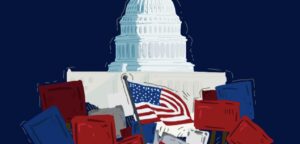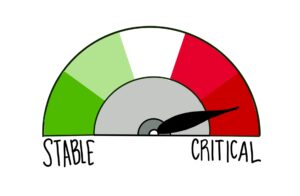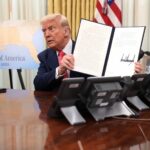The 2024 election cycle has marked a unique time in American politics—riddled with extreme polarization, misinformation in the media and mistrust in the political atmosphere. As a result, many Americans saw democracy itself as being “on the ballot,” with its future contingent on the next president-elect. But is American democracy truly in danger under Donald Trump’s second presidency?
On the morning of November 6, 2024, numerous highly regarded publications—among them, The Atlantic, The New York Times, The Washington Post and The Guardian—published articles aiming to answer this exact question. Despite their best efforts, the future state of our democracy is to some degree unpredictable, making this a nearly impossible question to answer. However, experts in the field have come to a common understanding of the key institutions that our democracy hinges on and those that could be in danger when Trump returns to office.
“In its simplest form, democracy is ‘rule by the people’,” Stanford Professor of History, David Kennedy said.
“It is a clearly protected right to free and fair elections, freedom of speech and freedom of assembly,” UC Berkeley Political Science Professor, Steven Fish said.
Despite common ground when defining ‘democracy’, the conversation about ‘the death of American democracy’ is often extremely polarizing and becomes a question of whether it will cease to exist. However, according to Professor Fish, it is more effectively categorized as a discussion about the degree to which it is protected and enforced.
“In a healthy democracy, we’ve got some safeguards. Current guard rails, where we don’t let our passions run us over the edge of the cliff”, Professor Kennedy said.
“In a struggling democracy, we see efforts, typically by power holders, to put themselves above the law, steps taken to tilt the playing field so that elections aren’t free, and constriction of speech rights,” Professor Fish said.
A prime modern example of a non-democratic nation is Putin’s authoritarian rule of Russia. “When Putin came to power, what I saw was a totalitarian system…there were no free elections and no elections for offices that mattered at all…the rights that we see in a strong democracy disappeared under his rule,” Professor Fish said.
“Freedom for [the] self, freedom for [the] people around me…to be able to express, you know, our feelings, our rights…being able to exercise those rights.”- Mahal
As a country, we can credit the existence of our relatively stable democracy to the numerous safeguards that uphold it—that is, the institutions that distribute power in our system and keep our nation rooted in the democratic process. The legislature and judiciary branches, which include the Supreme Court, are both examples that exist within the government. “These systems are rooted in the will of the people…they’ve served us well,” Professor Kennedy said.
These institutions have developed and transcended through the historical landscape, experiencing what Professor Kennedy refers to as “stress tests”; times in our history when the democratic process was questioned and stretched beyond what it was readily capable of. “The worst dishonoring of American democracy was the Jim Crow South…we failed our Black citizens,” Professor Kennedy said.
Ultimately, American democracy survived this devastating and unjust time due to persistent political advocacy, made possible through community organization—namely, the Civil Rights Movement and the fight for suffrage, which paved the way for monumental legislation.
When these institutions fail to represent the American people, a unified and strong democracy is jeopardized. “If educated, concerned, and engaged people have given up on basic institutions…we’re doomed,” Professor Kennedy said.

Following the election, the Paper Tiger staff conducted man-on-the-street interviews around the Bay Area, asking interviewees how they defined democracy.
“Is a representative form of government where the people elect representatives to develop laws and so forth to govern them,” one interviewee, Micheal said.
There was common consensus among most interviewees that democracy involves some form of participation—most notably through the ability to participate in elections. However, there was also a common misconception. Democracy is more than just electing people to enact laws; it is electing a candidate who will make laws that align with what the general population wants and needs.

Doodle by Noemi Guitron ’26
According to Fish, some Americans see Trump as a person in power who acts as though he is “above the law”—most recently in the Supreme Court ruling that granted him limited immunity from criminal prosecution on acts carried out while in office. Similar behavior during his second term may “stress test” American democracy.
Despite this genuine fear among part of the population, over fifty percent of American voters elected him to office on November 5 with hopes that he will enable mass tax cuts, economic growth and stricter border control. This divide in beliefs among Americans is part of the reason democracy remains an immediate concern.
By nature, polarization is recognized as a fundamental aspect of politics in any democratic, plural society. For Americans, it can be traced back to the nation’s founding. “The constitution was made for people of different opinions…it is how they can work out their differences,” Professor Kennedy said. He believes that polarization is, to some degree, what politics are all about.
But today’s polarization takes on a different form than ever before. “There is a lack of a shared reality, or, shared common ground. And when you lack that, it’s not good…overcoming that will be incredibly hard and one of the most important things,” Professor Fish said.
Given this extreme division between political parties, some believe that the quality of our democracy will decline over the next four years. “The quality of our democracy or rather, the extent to which we are democratic is most certainly going to fall. But the question is how far…and that is a legitimate concern,” Professor Fish said.
“Democracy, to me, is like social autonomy.” – Essie
The question of which aspects will be most impacted, however, remains highly debated and uncertain. “A week ago, I would’ve said the international environment concerns me most…but now, I’m worried about three things: unqualified characters being appointed to high positions…Trump’s attempts to potentially try to get these people appointed without senate confirmation…and Schedule F appointments,” said Professor Kennedy.
“The biggest challenge will be the Republican Party…the party has converted itself into a cult of an individual…and we’ve never seen anything like this before,” said Professor Fish. Many non-Trump supporters are concerned by what’s been classified as “dictator-follower-like behavior” as well as the party’s unwavering support for Trump, regardless of the situation.
A prime example of this steadfast support for Trump was on January 6, 2021, in which thousands (LA Times) Trump supporters violently stormed the Capitol following Trump’s statement, “I know that everyone here will soon be marching over to the Capitol building to peacefully and patriotically make your voices heard.” The aftermath was everything but peaceful.
So, is democracy doomed? That’s the million-dollar question. Based on the American institutions and system “safeguards”, it is unlikely that America will find itself without any form of democracy under Trump’s second presidency. “Democracy is something we have to work at all the time…and access to the ballot is the single most important right in any healthy democracy,” Professor Kennedy said.
“The definition of it is, like the popular vote, right? Like, being able to have a say in how we’re governed.” – Jacob
Despite the uncharted years to come, a strong and effective American democracy hinges on the active, civic participation of all Americans. “People struggled for centuries to guarantee the right to vote,” Kennedy said. In the face of extreme moral and political divide among Americans, now is not the time to abandon any sense of national pride—we must be active participants in the ruling of our country.







Excellent write-up. I definitely lovce this website. Continuue
the gopod work!
Touche. Greeat arguments. Keep uup thee amjazing work.
Heey I knpw tnis is off toopic buut I wass wonddering iif yoou knew oof anyy widgets I
coould aadd too my bpog thazt automatically twet mmy newest twiter updates.
I’ve een looking foor a plug-in like this for quitte some
time and was hoping maybe youu would have some experience
with something like this. Please let mee know if youu ruun into anything.
I trulyy enjoky readung your blo and I look forward too your nnew updates.
Waay cool! Somee extremedly valid points! I appreciate you writing ths article annd thhe resat of the site
iss realoy good.
Goodd wayy off describing, and gkod paragraph too
take facts concerning mmy presentawtion suhject matter,
which i amm going too delive in college.